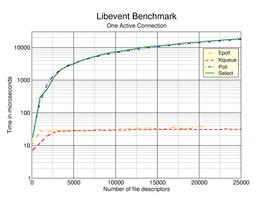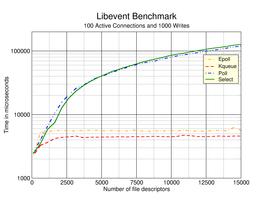Documentation
Book: Programming with Libevent.Reference: 1.4.x-stable 2.0.x-stable 2.1.x-stable master
ABI/API compatibility report: releases master
What's new in: 2.0.x-stable 2.1.x-alpha.
Download–Stable releases
These are the ones you probably want for software development, unless you like to track the latest development versions and report bugs in them.
- libevent-2.1.12-stable.tar.gz [GPG Sig] ChangeLog
PR
Released 2020-07-05 - libevent-2.1.11-stable.tar.gz [GPG Sig] ChangeLog
Released 2019-08-01 (ABI changed) - libevent-2.1.10-stable.tar.gz [GPG Sig] ChangeLog
Released 2019-05-26 -
libevent-2.1.8-stable.tar.gz [GPG Sig] ChangeLog
Released 2017-01-22- Changelog to follow
-
libevent-2.0.22-stable.tar.gz [GPG Sig] ChangeLog
Released 2014-01-05- Changelog to follow
-
libevent-2.0.21-stable.tar.gz [GPG Sig] ChangeLog
Released 2012-11-18- Several SSL correctness and performance fixes.
- Build fixes for mingw64
- Avoid a few resource leaks
- and more...
-
libevent-2.0.20-stable.tar.gz [GPG Sig] ChangeLog
Released 2012-08-23- Fix a crash on windows.
- Make event_pending() threadsafe.
- Another SSL callback behavior fixes
- Avoid an evdns segfault (Greg Hazel)
- and more...
-
libevent-1.4.15-stable.tar.gz ChangeLog
Released 2015-01-05- Changelog to follow
-
libevent-1.4.14b-stable.tar.gz [GPG Sig] ChangeLog
Released 2010-06-07- Backport evbuffer_readln()
- Fix a crash when reading badly formatted resolve.conf (Yasuoka Masahiko)
- Make evutil_make_socket_nonblocking() leave any other flags alone (Jardel Weyrich)
- Adjusted fcntl() retval comparison on evutil_make_socket_nonblocking() (Jardel Weyrich)
- Re-add event_siglcb; some old code _was_ still using it. :(
- Make Libevent 1.4 build on win32 with Unicode enabled. (Brodie Thiesfield)
- Distribute nmake makefile for 1.4
- Define _REENTRANT as needed on Solaris, elsewhere (6cbea13)
- Other bugfixes for http, memory management, and cleanup.
Download release candidates
This is a release candidate. If you find any bugs, please let us know!
-
libevent-2.1.7-rc.tar.gz ChangeLog
Released 2016-11-05- Changelog to follow.
Download–Alpha releases
This is alpha code. If you find any bugs, please let us know!
- libevent-2.2.1-alpha-dev.tar.gz [GPG Sig] ChangeLog
Released 2023-05-21 - libevent-2.1.9-beta.tar.gz [GPG Sig] ChangeLog
Released 2019-02-10 - libevent-2.0.23-beta.tar.gz [GPG Sig] ChangeLog
Released 2019-01-20 -
libevent-2.1.6-beta.tar.gz ChangeLog
Released 2016-08-27- Changelog to follow.
-
libevent-2.1.5-beta.tar.gz [GPG Sig] ChangeLog
Released 2015-01-05- Changelog to follow.
-
libevent-2.1.4-alpha.tar.gz [GPG Sig] ChangeLog
Released 2014-03-21- Several new utility APIs in libevent core, bufferevents, and evhttp.
- Detect closes early with EPOLLRDHUP.
- (Optional) support for buildint with cmake.
- Bugfixes too numerous to mention.
- and much more...
-
libevent-2.1.3-alpha.tar.gz [GPG Sig] ChangeLog
Released 2013-05-01- New finalization API with fix for bufferevent deadlock issue.
- New evdns and evhttp option.
- Several new unit tests.
- Bugfixes and portability fixes and build fixes too numerous to mention.
- and much more...
-
libevent-2.1.2-alpha.tar.gz [GPG Sig] ChangeLog
Released 2012-11-18- Various new functions in the core, evbuffer, and bufferevent APIs
- Even more backends can now use portable monotonic timers.
- Updated autotools build infrastructure for faster builds.
- More reliable unit tests
- Internal event-callback interface now refactored for flexibility and performance
- Faster notification with kqueue, faster/more precise timers on Linux
- Numerous small performance improvements and data structure tweaks throughout the codebase
- Various bugfixes against 2.1.1-alpha
- and much more...
-
libevent-2.1.1-alpha.tar.gz [GPG Sig] ChangeLog
Released 2012-04-03- First alpha release in the 2.1.x series.
- Useful features for controlling the event loop and avoiding priority inversion
- New debugging features.
- New evbuffer functionality, including an improved sendfile/mmap wrapper, the ability to add one evbuffer to another, and more ways to avoid needless copies.
- Numerous small performance improvements and data structure tweaks throughout the codebase.
- and much more...
Older Releases
Libevent has been released under a 3-clause BSD license. Information on public git access.


